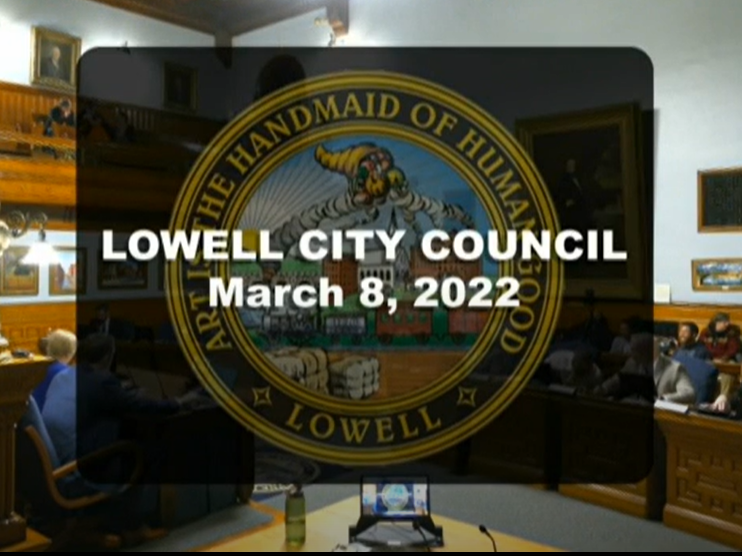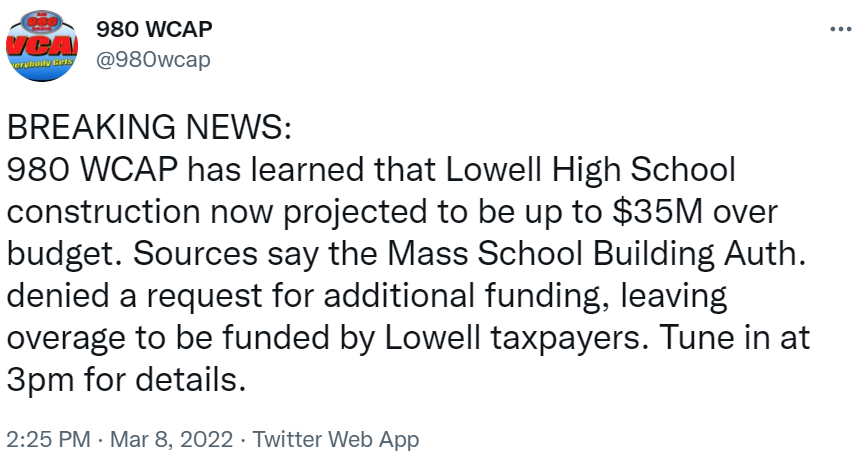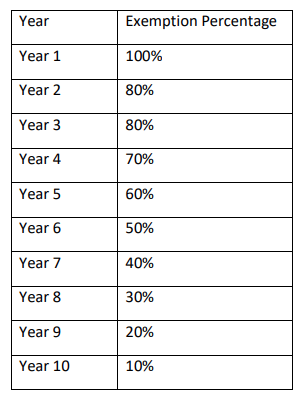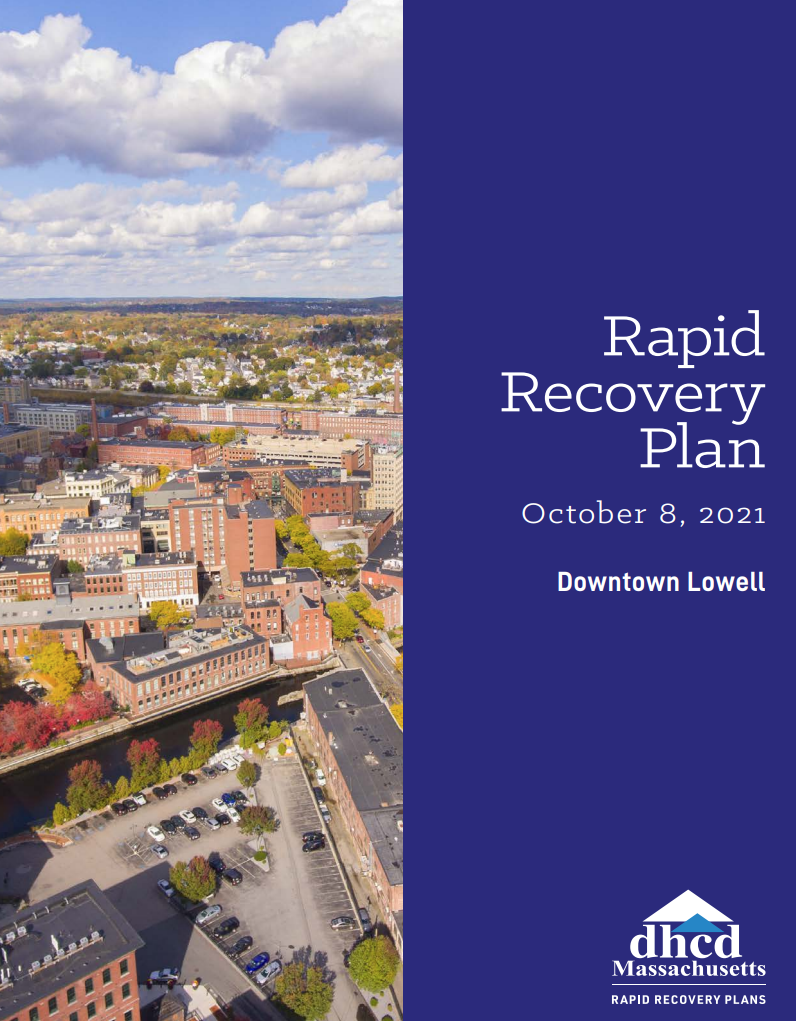
First, apologies for missing last week’s recap – I had a work commitment Tuesday and Wednesday and a recap seemed pointless by the time I got around to watching the meeting later in the week.
1. Lowell High Project
Despite repeated warnings from the administration that the Lowell High Project would encounter the same exact Covid cost increases that every American citizen and business has been subject to, people took the opportunity to lose their minds when the following was published yesterday afternoon:

Manager Donoghue was hoping to have exact figures available to the council by meeting time, but they will not be ready until later this week. Representatives from the project were on-hand to attempt to describe why the numbers were higher than anticipated pre-Covid. The number quoted by WCAP is not “official,” but based on the discussion, sounds like it’s about right. We should have more answers and likely more questions when additional numbers are released later this week. In the meantime, we ponder the following:
1. Why is Lowell being stuck with these costs?
At the state level, the MSBA exists to assist local communities with necessary school building projects that they would otherwise be unable to afford. Without the MSBA, Lowell would not be in the middle of this construction project right now. However, the realities of the pandemic have hit us and hit us hard. To date, the state has told us we are now on our own. As per comments made by Manager Donoghue, the MSBA has expressed sympathy for our plight (thank you for the thoughts and prayers), but insists that its hands are tied when it comes to changing the deal.
Which leaves us with the legislature and the governor’s office. Gov. Baker knows where to find Lowell when he needs Democrats for photo-ops and fundraisers – perhaps he could repay the favor instead of watching us drown on the way out the door?
In addition, we should expect an all-hands on deck push by our state delegation to get things moving. I can’t help but notice that Lynn’s delegation has pushed legislation aimed at remedying some of the MSBA’s outdated practices that disproportionately burden Gateway Cities. Is the ink currently drying on our delegation’s similar bill? Can we expect a joint press-release on what’s being done in the coming days?
At the federal level, the City is “sitting” on a large pile of ARPA funds designed to mitigate the economic impact of Covid. However, based on guidance by accounting firm Powers & Sullivan, the City is (allegedly) unable to apply these funds to cost increases directly caused by the Covid pandemic. Multiple Councilors noted the absurdity of this situation. I tend to agree with comments made by Councilor Gitschier suggesting that it may be best to ask for forgiveness rather than permission and spend the monies on the high school. We can defend our actions, if necessary, at a later date.
I disagree, however, with comments made by Councilor Yem that we need to look at more “value engineering” of the project as a means to save money. This should be off the table and this type of talk will cast a pall on the quality of the entire project. Twenty years from now, any dollar cut from this project will be looked upon with scorn. Let’s get it right now, while we have the chance.
2. Is it more important to deliver a top-quality school or win blame-games?
I hesitate to even bring this up as I too would be guilty of adding oxygen to the fire. However, it seems that some, including Councilor Mercier, are using Covid costs to argue that none of this would be happening if the school was built at Cawley. The theory is that work would have started sooner and would have been completed before Covid-related costs were incurred. A problem with this argument is that it assumes too much. Would Cawley have not faced its own legal challenges and other delays? These questions get swept under the rug. In addition, it’s just as easy to argue that the Downtown project would be much further along if we were not saddled with a unpopular fight, advanced by a minority of residents, to move the school to Cawley in the first place.
Even if we assume these arguments are 100% correct – WHO CARES? The school is not at Cawley. Phase 1 downtown is nearly complete. How is it in any way productive to reignite the site issue? Do we want to work towards completing a successful project or do we want to play harmful blame-games?
2. Hamilton Canal and TIF Agreement with Lupoli Companies
In addition to a report providing an update on the HCD, a vote came before the council authorizing the City Manager to enter into a Tax Increment Financing (aka “TIF”) Agreement with 330 Jackson Street, LLC (a Lupoli Company). A TIF agreement is a negotiated agreement between a company and the municipality that exempts new property taxes as a result of new development and job creation as an incentive to make the project possible. This specific TIF is designed to incentivize the construction of a 500 space parking garage. The schedule of tax exemption is as follows:

The cynic in me views TIF agreements as the siphoning off of public revenue to further line the pockets of wealthy private corporations. Individual citizens are generally not offered city tax-breaks to build or improve their properties. Further, as per city policy, smaller businesses are left out of these deals. Unlike other communities, Lowell’s DPD does not consider TIFs for small scale retail or restaurants. Rather, our TIF agreements are almost exclusively used to jump-start large scale mega-projects. Perhaps we should be betting on smaller, more incremental investments to spread the risk?
On the other hand, the realist in me recognizes that TIFs are a tool in every municipalities’ box of tricks and Lowell needs to compete to lure business and development. The representative from Lupoli Companies was quick to point out they had received more generous TIF agreements on other projects.
With respect to this specific TIF, we allegedly need another garage and without the TIF, Lupoli would probably not have built one. In addition, as pointed out by Christine McCall of DPD – the currently vacant lots in the HCD are not generating much property tax revenue and, over time, we will begin to reap more and more benefit from developing these parcels. As always, time will tell whether this is a good deal or not.
Dig Deeper on Other Lowell TIF Agreements
Council Jenness inquired as to how this agreement compares with older TIF agreements. A report was filed in 2017 during Kevin Murphy’s administration providing some details. I may have imagined it, but I thought there was something filed more recently, but I was unable to find it before posting this morning. In any event, here’s some detail from the 2017 report:

3. Downtown Rapid Recovery Plan

A report was filed in response to a Motion by Councilor Nuon seeking a presentation on the Downtown Rapid Recovery Plan. Unfortunately, little was said about the report, likely due to the size and scope of the report coupled with the size and scope of the agenda. The report was sent to sub-committee for further discussion. Hopefully, we will see this plan emerge for a much more detailed discussion. It’s a monster at 145 pages and worth checking out.
4. Homelessness & Affordable Housing
Bundling these topics together as there was overlap during the discussion. As to homelessness, a report was filed providing an update on efforts undertaken by the city to address the issue. However, I was most impressed by a registered speaker, Patricia Hart (I believe) of Matthew 25:35 (a non-profit), who reported on the work her organization does to feed and clothe approximately 175-185 unhoused individuals in the city. A request was made for better trash pick-up, better coordination among agencies, and assistance from the city with job placement.
As to the establishment of an Affordable Housing Trust, pursuant to MGL c. 44 s. 55C, the Council can vote to establish a local housing trust allowing the city to collect funds for affordable housing, segregate them out of the general municipal budget into a trust fund, and use the funds for local initiatives to create affordable housing. Examples provided in the report include:
• Provide financial support for the construction of affordable homes by private developers (nonprofit or for-profit);
• Rehabilitate existing homes to convert to affordable housing;
• Increase affordability in new housing development projects;
• Develop surplus municipal land or buildings;
• Preserve properties faced with expiring affordability restrictions;
• Create programs to assist low-and moderate-income homebuyers;
• Create programs to assist low-and moderate-income homebuyers;
• Educate and advocate to further affordable housing initiatives.
The matter was referred to sub-committee for further discussion.

Ryan what disturbs me is that in April of 2020 the MSBA notified all partners of the following: “The Massachusetts School Building Authority issued a statement today reminding districts that grant amounts and reimbursement rates that districts can receive for school construction projects are set at the time of project approval, and the authority cannot later increase those amounts.”
“Several districts with projects in the MSBA’s capital pipeline have contacted the authority with concerns related to the effect that the COVID-19 pandemic is having on projects. Each district and each project is facing its own challenges, according to the MSBA, depending on what phase the project is in, as well as each district’s decisions on implementing COVID-19 guidelines. Some of the major concerns conveyed to the authority regard MSBA deadlines, project schedules and potential budget increases.”
Yet in May of 2020 when responding to a motion by Councilor Rourke never mentioned that MSBA said they could not increase amounts. The City Administration dropped the ball. This should have NOTHING to do with location, Cawley was a 3 year timeline, that had the city paying a higher share with lower reimbursement from the MSBA. The higher cost of material would have ht that project also.
As to the site issue – I agree – I was just repeating the gist of the argument/theory that’s been floating around. As to your substantive point – I believe you are referring to this: https://www.lowellma.gov/AgendaCenter/ViewFile/Item/12622?fileID=25827.
In context, the pandemic was 2 months old and the cost increases had not ramped up. Things were essentially still shut down. My take at the time was that the response was assure the council that the money promised would still be there.